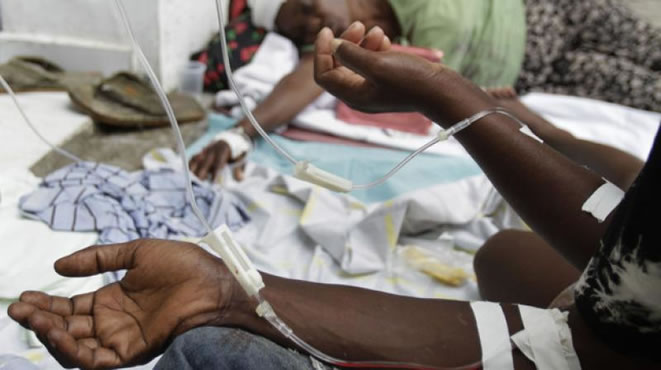As schools resume from the mid-term break and Sallah holiday on Wednesday, concerns have been raised over the potential risk of cholera outbreak among pupils.
According to public health experts, the disease, which has been reported in several states across the country, could spread rapidly in schools if preventive measures are not put in place.
The Chief of UNICEF, Lagos Field Office, Celine Lafoucrier, has called for extensive measures to protect school children, noting that concerted efforts must be made to prevent disruption in the academic calendar over the spread of the disease.
The Nigeria Centre for Disease Control and Prevention (NCDC) had recently warned the public of the increasing trend of cholera cases as the rainy season intensifies. From January 1 to June 11, 2024, over 1,141 suspected and over 65 confirmed cases of cholera, resulting in over 30 deaths, had been reported from 96 LGAs in 30 states.
The centre noted that the 10 states contributing 90 per cent to the burden of the current cholera outbreak include Bayelsa, Zamfara, Abia, Cross River, Bauchi, Delta, Katsina, Imo, Nasarawa, and Lagos states.
Lafoucrier noted that children faced substantial health risks, particularly those under five, who are prone to severe dehydration and higher mortality rates. She explained that post-recovery issues in children can include malnutrition, stunted growth, and weakened immune systems, increasing susceptibility to other diseases.
The UNICEF official said educational disruption is another critical consequence of cholera outbreaks, as an illness and the need to care for sick family members lead to school closures and reduced attendance, hindering children’s learning and development.
UNICEF advises government that “Addressing the challenges of cholera outbreaks requires a deliberate focus of state policies to provide high-standard water and sanitation facilities, as well as strengthened healthcare systems capable of responding to the demand in times of outbreaks, and state-led educational campaigns on cholera prevention to protect children and the population at large.”
Public health experts, including Prof Kayode Osagbemi, a professor of public health at the University of Ilorin and Consultant Public Health Physician at the University of Ilorin Teaching Hospital, Kwara State, have warned that the infection could spread in schools if measures are not taken to prevent it.
Osagbemi said, “There will be gatherings of people in schools, and the moment they (schoolchildren) are sharing items, it can spread. If any of them is infected, it can spread to others, rather than if they are in their homes. “Generally, the spread in schools is not a major concern, except maybe in boarding houses. In boarding houses, one person infected may infect others through contamination of the water and their food.”
Other experts, including Dr Abdurrazzaq Alege, a Consultant pediatrician at the Federal Teaching Hospital, Katsina State, and Dr Lekan Adelakun, the Team Leader/Chief Executive at Q-Impact Medicare, have also warned that cholera could spread fast among students due to the rainy season, holidays, and poor hygiene.
Dr Olurotimi Fagbule, an Osogbo-based medical practitioner, said the reopening of schools after the Sallah holiday was a risk factor that must be addressed. He called for stringent measures to be adopted to prevent the outbreak of the disease in schools as pupils resume.
Meanwhile, the Lagos State Government has said it will activate the guidelines used during the COVID-19 era in a bid to curb the spread of the disease. The Lagos State Commissioner for Information and Strategy, Gbenga Omotoso, said an emergency response committee that included representatives from the education sector, met on Monday.
In Ogun State, the Commissioner for Health, Dr Oluwatomi Coker, confirmed three reported cases of cholera in the state. Coker said that two of the cases occurred in the Ado-Odo/Ota Local Government which borders Lagos State, while the third case was reported in the Abeokuta South Local Government.
The commissioner said that the people involved in the three cases had also recently been to Lagos State and that no death had so far been recorded. Coker said that “there is, however, no need for anyone to panic because we have always been on our toes and proactive to combat any kind of epidemic which comes with the rainy season.
In other states, including Ekiti, Sokoto, Benue, and Gombe, measures have been put in place to prevent the outbreak of cholera in schools. The Delta State government said it had put under control the recent cholera outbreak in the state.
The state Commissioner for Health, Dr Joseph Onojaeme, said currently there was no cholera in the state, adding that the two cases recorded two weeks ago had been put in check.
Overall, the concern remains that cholera could spread rapidly in schools if preventive measures are not put.




